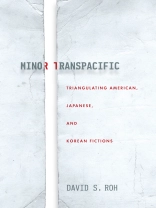There is a tendency to think of Korean American literature—and Asian American literature writ large—as a field of study involving only two spaces, the United States and Korea, with the same being true in Asian studies of Korean Japanese (Zainichi) literature involving only Japan and Korea. This book posits that both fields have to account for three spaces: Korean American literature has to grapple with the legacy of Japanese imperialism in the United States, and Zainichi literature must account for American interventions in Japan. Comparing Korean American authors such as Younghill Kang, Chang-rae Lee, Ronyoung Kim, and Min Jin Lee with Zainichi authors such as Kaneshiro Kazuki, Yi Yang-ji, and Kim Masumi, Minor Transpacific uncovers their hidden dialogue and imperial concordances, revealing the trajectory and impact of both bodies of work.
Minor Transpacific bridges the fields of Asian studies and Asian American studies to unveil new connections between Zainichi and Korean American literatures. Working in Japanese and English, David S. Roh builds a theoretical framework for articulating those moments of contact between minority literatures in a third national space and proposes a new way of conceptualizing Asian American literature.
Table of Content
Introduction: Triangulating Fictions
1. The Japanese Empire, American Industrialism, and Korean Labor: Younghill Kang’s East Goes West as Colonial Critique
2. American Racial Discourse in Zainichi Fiction: Transpacific Cultural Mediation in Kaneshiro Kazuki’s GO
3. Korean American Literature Has Always Been Postcolonial: Clay Walls, A Gesture Life, and Colonial Trauma
4. International Study and Sojournship: Absence and Presence in Seoul Searching and Yuhi
5. Los Angeles and Osaka Are Burning: Diasporic Minority Transpositions in Pachinko and Moeru Sōka
Coda: Zainichi, Korean, American
About the author
David S. Roh is Associate Professor of English at the University of Utah.












